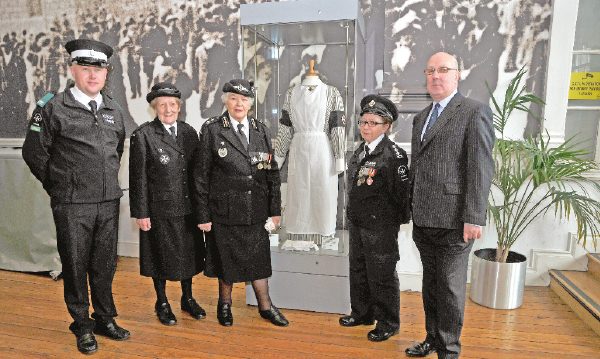
St. John’s Ambulance Group at Dublin City Library and Archive
Doing their Bit: Irish Women and the First World War’ is a new exhibition in Dublin City Library and Archive in Pearse Street. The exhibition centres on the impact that the First World War had on the lives of Irish women and the new opportunities that opened up for them.
Speaking about the exhibition, senior archivist Ellen Murphy said “The role of Irish women in World War One is a story that is yet to be fully told. Against the backdrop of the campaign for female suffrage and the struggle for Irish Independence, this exhibition explores how the First World War impacted the lives of Irish women and greatly accelerated the changes which had been slowly taking place in society before the outbreak of war.
By 1918 Constance Markievicz was the first woman elected to the British House of Commons and many Irish women had experienced new economic or social freedoms through the employment and volunteer opportunities offered by the war.”
The exhibition draws on the rich vein of archival materials contained in the Royal Dublin Fusiliers Association Archive held at Dublin City Library and Archive, to tell a multitude of women’s stories from Voluntary Aid Detachment nurses to munitions workers, home front volunteers, anti-enlistment activists and separation women.
Other artefacts available for public viewing are a ‘death penny’ commemorating Sgt Michael Guilfoyle of the Royal Dublin Fusiliers, killed at Salonica in 1916 and a book of poetry by the renowned republican poet Maeve Cavanagh.
Two notable women are highlighted in the exhibition; Kate Middleton Curtis a distinguished member of St. John Ambulance in Dublin who referred to herself as ‘The oldest ambulance lady in Ireland’ and Monica Roberts, a young Stillorgan woman who in 1914 established ‘The Band of Helpers for the Soldiers.’ This voluntary group sent ‘home comforts’ such as cigarettes, food, clothing and watches to Irish soldiers in the front line. Kate’s diary and other medical artefacts, as well as letters and postcards from the Monica Roberts collection, are on display.
The exhibition runs at Dublin City Library and Archive, 144 Pearse Street, Dublin 2 until 28th April 2018, open during library hours. The exhibition will be accompanied by free guided tours and a programme of talks in both City Hall and Dublin City Library and Archive. Exhibition opening hours are Monday-Thursday 10am-8pm and Friday-Saturday 10am-5pm. Closed 31 March-2 April 2018 inclusive. Guided tours are available at 3pm Sat 24 March and every Saturday in April at 11am. Booking required via https://doingtheirbit.eventbrite.ie
Members of the public are encouraged to contact Dublin City Library and Archive (DCLA) @dclareadingroom using the hashtag #doingtheirbit if they have stories to tell of their own relatives during the First World War or want to enquire about anything in the exhibition.
There will also be a lunchtime lecture series in City Hall. The accompanying lunchtime lecture series runs every Tuesday in City Hall during the month of April at 1.10 pm and explores different aspects of Irish women’s experiences throughout World War One from anti-enlistment activism to working in munitions factories and war-time nursing.
The final lecture in the series by keynote speaker Dr. Fionnuala Walsh assesses the legacy and long-term impact of World War One on the role of women in Irish society. Details can be found on: http://bit.ly/CityHall2018LectureSeries
A talk will also take place on 17th April at 6.30 pm at Dublin City Library and Archive titled “Women of the Brigade: St John Ambulance and the First World War”. Speaker is Padraig Allen, honorary archivist and project manager with St John Ambulance, Ireland. No booking required. Seats are first come, first served.The exhibition is curated by Dublin City Library and Archive and funded by Dublin City Council Decade of Commemoration.
http://www.dublincity.ie/main-menu-services-culture-and-amenities-dublin-city-public-libraries-and-archive-events/women

